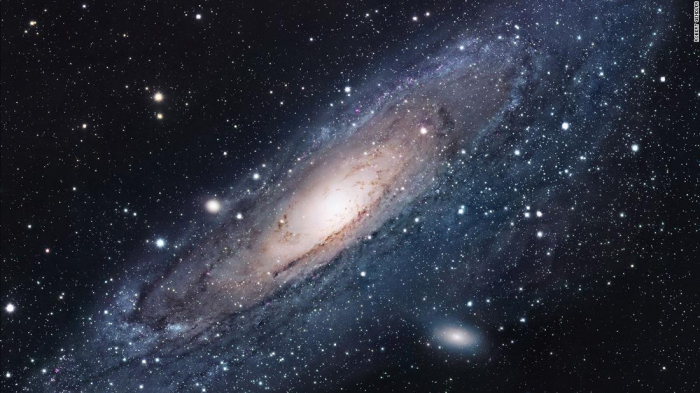Scientists have mapped the Andromeda, which is twice the size of our own galaxy, the Milky Way, and found remnants of other galaxies floating inside it.
This means it has already gobbled up smaller galaxies over the last ten billion years, scientists have found after the theory that it would eventually devour the Earth was first devised 15 years ago.
They predict it will be four billion years before the Earth and surrounding planets are consumed by their giant neighbour.
The result of the collision could be catastrophic and destroy planets and stars in both galaxies if they smash together or get too close to one another.
However, there is some skepticism surrounding this disastrous event as it is unlikely to occur as stars in galaxies are spaced sufficiently sparsely that direct collisions between stars are rare.
'The Milky Way is on a collision course with Andromeda in about four billion years,' said Dr Dougal Mackey, from the Australian National University.
'So knowing what kind of a monster our galaxy is up against is useful in finding out the Milky Way's ultimate fate.
'Andromeda has a much bigger and more complex stellar halo than the Milky Way, which indicates that it has cannibalised many more galaxies, possibly larger ones.'
However, Mackey told CNN that this event is unlikely to wreck havoc on our world.
'I think it's unlikely the Earth will be physically destroyed by the collision with Andromeda,' Mackey told CNN.
'It's not out of the question, but in general the stars in galaxies are spaced sufficiently sparsely that direct collisions between stars are rare.
' However, it's possible that the Sun could be thrown out of the merged Andromeda and Milky Way system by the collision, into intergalactic space, and/or a nearby close passage with another star could perturb the Earth's orbit such that the Earth can no longer support life.'
The Andromeda galaxy is about 10billion years old and has grown larger over that time by absorbing other, smaller, collections of stars and planets.
Our own galaxy is approximately 100,000 light years across.
And although the Andromeda had long been thought to be far larger – around 220,000 light years – research last year suggested the Andromeda may actually be a similar size.
Even if Earth doesn't smash into anything when the galaxies collide, it is predicted to be flung out of position and out of reach of the Sun's vital warmth, spelling disaster.
But Dr Mackey and his colleagues' research reveals the Andromeda, some 2.5million light years away from us, is no stranger to gobbling up other galaxies.
A galaxy named Triangulum has been found alongside stellar streams – the remains of smaller galaxies or star clusters – within the Andromeda nebula.
Tracing how these collections of stars and planets were absorbed into the Andromeda has given an insight into how the galaxies have merged together.
One confusing element, the team found, was that they appeared to have collided from different directions.
'This is very weird and suggests that the extragalactic meals are fed from what's known as the 'cosmic web' of matter that threads the universe,' said Professor Lewis from the University of Sydney.
'More surprising is the discovery that the direction of the ancient feeding is the same as the bizarre 'plane of satellites', an unexpected alignment of dwarf galaxies orbiting Andromeda.
'This deepens the mystery as the plane must be young, but it appears to be aligned with ancient feeding of dwarf galaxies.
'We're going to have to think quite hard to unravel what this is telling us.'
The research was published in the journal Nature.
Daily Mail
















































